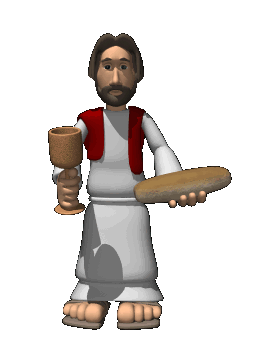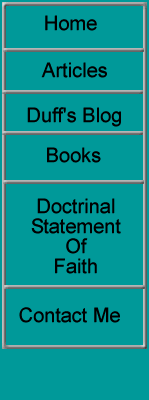
DO IN REMEMBERENCE
OF ME



THE LORD'S SUPPER (BREAKING OF BREAD)
By: Rex Duff
Most dedicated Christians if you ask them, "How often do
I need to go to Church", will at least say every Sunday, maybe every Saturday if they follow the Sabbath. From the book of Acts we find why we go to church.
In Acts 2:42 the Bible states, "And they continued steadfastly in the apostles' doctrine and fellowship, and in breaking of bread, and in prayers."
In Mark 14:22- 26, the Bible states, "And as they did eat, Jesus took bread, and blessed, and brake it, and gave to them, and said, Take eat; this is My body. And He took the cup, and when He had given thanks, He gave it to them: and they all drank of it. And He said to them, This is My blood of the new testament, which is shed for many. Verily I say unto you, I will not drink no more of the fruit of the vine, until that day that I drink it new in the kingdom of God. And when they had sung an hymn, they went out into the mount of Olives."
In I Corinthians 11:23-32 the Bible states, "For I have received of the Lord that which also I delivered unto you, That the Lord Jesus the same night in which He was betrayed took bread: And when He had given thanks, He brake it and said, Take eat: this is my body, which is broken for you: this do in remembrance of me. After the same manner also He took the cup, when He had supped, saying, This cup is the new testament in my blood: this do ye, as oft as ye drink it, in remembrance of me. For as often as ye eat this bread, and drink this cup, ye do shew the Lord's death till He come. Wherefore whosoever shall eat this bread, and drink this cup of the Lord, unworthily, shall be guilty of the body and blood of the Lord. But let a man examine himself, and so let him eat of that bread, and drink of that cup. For he that eateth and drinketh unworthily (in an unworthy manner), eateth and drinketh damnation (judgment) to himself, not discerning the Lord's body. For this cause many are weak and sickly among you, and many sleep. For if we would judge ourselves, we should not be judged. But when we are judged, we are chastened of the Lord, that we should not be condemned with the world".
As we see from Acts 2:7, there were 4 things done by the early Church each Saturday. The key word here is steadfastly. The Greek Word here can be translated, to adhere closely to, or continually. Thus it was something the early Church thought was very important!
Notice the 4 things the Bible states were needed for proper worship of God on the seventh day of the week.
1-
Apostles' doctrine. The early Church
considered doctrine very important. This was done through Biblical
preaching. The message taught God's Word, not a powder puff sermon.
2- Fellowship. The early Church considered time with the Believers each Saturday very important. That is why I believe a Church to be Biblical should have a time of Fellowship each Saturday. Does that mean a full meal? I do not think so, but a Saturday pot-luck Lunch every Saturday, seems to have been practiced for Fellowship by the early Church. See I Corinthians 11:20-22.
3- Breaking of Bread.
The early Church knew that the Breaking of Bread every Saturday
was just as important as Preaching. Lewis Chafer and John Walvoord,
past presidents of Dallas Theological Seminary in Major Bibles
Themes page 272 states, "It seems probable that
the early Christians practice it frequently, perhaps as often
as each week, as they gathered to celebrate the
resurrection of Christ". According to Philip Schaff, The
History of The Christian Church, page 473, "The Apostle
requires the Christians to prepare themselves for the Lord's Supper
by self-examination, or earnest inquiry whether they have repentance
and faith, without which they cannot receive the blessing".
Thus every believer who had Repentant and had faith, was welcome
to participate. Schaff, volume 2, page 236 adds, "none can
partake but the believing and baptized". He also states on
page 236, "The communion was a regular and the
most solemn part of the worship; or it was
the worship of God in the stricter sense". A warning was
given even in I Corinthians, already quoted, about the miss-use
of the Lord's Supper. It appears that the early Church used Baptism
and a declaration of faith, to determine who should partake of
the Lord's Supper.
4- Prayers. I cannot imagine a Church service without prayer, and I have notice that prayer is still a part of evangelical Churches.
I would like to point out that singing is not a requirement to worship. Neither are offerings, announcements, or testimonies needed!
Why than do we not remember Christ every Saturday? Some say that because the Bible states as often as you do it, (I Corinthians 11:25 and 26) that means we can do it once a year, quarterly, twice a year, or whenever the Preacher wants to. Another explanation might be that you must remember Christ each time you do it each Sunday, see I Corinthians 11:29 and I Corinthians 10:16-17. Acts 2:46, the breaking of bread daily, appears to be eating a meal not practicing the Lord's Supper. The Greek word (as often as)used in I Corinthians 11:25 and I Corinthians 11:26, , can be translated (as many times as). Therefore, whether your assembly is breaking bread the fifth time or the nine hundred and fifth nineth time, you are to each time remember Christ alone, at the breaking of bread.
Now, what is to be the elements in the Lord's Supper. If we go back to Matthew 26:19-30, we see the Lord started the Lord's Supper from the Passover Meal. Therefore it had to be unleavened bread (Exodus 12:8-14) and unleavened juice (Isaiah 65:8); (Deut. 32:14); & (Exodus 12:18-20) If we look at Mark 14:25 and Luke 22:18, we find grape juice. According to Matthew 26:17, 26; Mark 14:12,22; and Luke 22:7,19; the bread could only be unleavened bread.
Much has been written on the elements, but in the Bible Leaven is a picture of sin! (I Corinthians 5:6-8)
I believe to give alcohol in the name of Christ could bring the curse of Habakkuk 2:15 upon your heads. I am amazed how foolish Christians can be.
Many today say because the breaking of bread was practice daily very early in Church history (Acts 2:46) that the bread had to be leavened. However, as stated above, Acts 2:46 appears to be a meal and not the Lord's Supper. Even if they took the bread off of the table and broke it to remember the Lord, the following points should be considered.
First-let us remember that no where in the Bible does it state this! This amounts to making Christ a common thing. It also makes Christ a picture of a sinful man, not a sinless God-man, because Leaven is a picture of sin. .
Secondly - These first believers were Conservative Jews, not modern day Gentiles. These Jews were use to making every attempt to keep the law. For them to make unleavened bread, being a Jew was very easy.
Thirdly-Even though those who propose leaven bread now, agree that the Lord used unleavened bread, at the first Lord's Supper. See (His Dying Request, by David Dunlap, page 58).
Fourthly - If a Church serves leven bread in the breaking of bread, they are symbolically denying the Resurrection of the Lord Jesus Christ. One of the characteristics of leven is corruption. Yet the Bible states in Acts 2:27, "Nor will You allow Your Holy One to see corruption". By partaking leaven bread you are saying his body became corrupted.
Many modern Baptist
state that the Lord's Supper every Saturday is a Brethren invention.
However, Calvin, Luther, John & Charles Wesley and Jim Elliot
all taught a weekly celebration of the Lord's Supper.
See His Dying Request, by David Dunlap, Chapter 1)
Furthermore, the most recognized Baptist Pastor in the last two hundred years, is probably Charles Haddon Spurgeon of London, England. He lived from 1834 until 1892. After his death his works continue to be published. He taught and practice weekly breaking of bread, while he was the Pastor of the great Metropolitan Baptist Tabernacle.
A very important question comes up about who can partake of the Lord's Supper. I would like to express my view on what the Bible teaches. I will not state any proof text's for this, or quote any author, who supports my view. I believe without some restrictions, what Jesus taught in Matthew 18:15-20, has no meaning for today!
1-- The person must be saved
2-- The person must have been Baptised
3-- The person must be an obedient Christian. Therefore, a woman who refuses to wear a head covering in the service, should not be permitted to partake in the breaking of bread, or a brother under discipline
4-- In order to maintain Church discipline, and know who visting from another assembly is under discipline or not, a Church letter should be required. What I believe is commonly called, close communion!
Finally, many sincere Sovereign Grace Christians have argued for Alcohol in the Lord's Supper based on I Corinthians 11:20-22. Here the Corinthians had a time of Fellowship before the Lord's Supper, (a Love Feast.)
Many look at I Corinthians 11:21, and state they were using Alcohol in the Corinthian Church. The problem is the word translated drunken. It is the same word used in John 2:10.
Therefore, if the Corinthians were getting drunk in I Corinthians Chapter 11, the Lord was getting people drunk in John 2. Neither of these statements is true!. What they were doing in the Corinthian Church was this:
1- Everybody brought food. Some were
slaves and brought hardly anything. Some were Masters and brought
a lot.
2- Unlike the modern practice of putting everything together
as a pot luck time of fellowship, they kept their own food to
themselves.
3- Therefore, some of the Christians stuffed themselves, and some
went hungry.
4- They demonstrated a lack of Christian love, right before the
breaking of bread.
5- The Greek word translated drunken is the Greek word (methuo).
It is best translated -- to be full. Here, some
were full of food, and some went hungry.
It was the Corinthians lack of love, not drunkeness,
that created Paul's sharp rebuke of their practice!